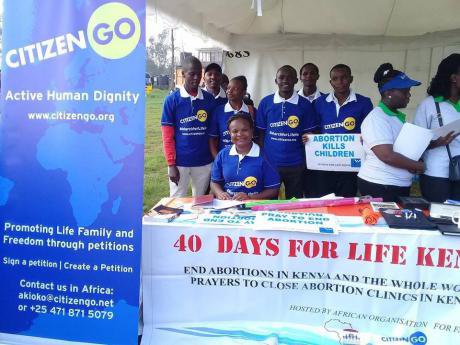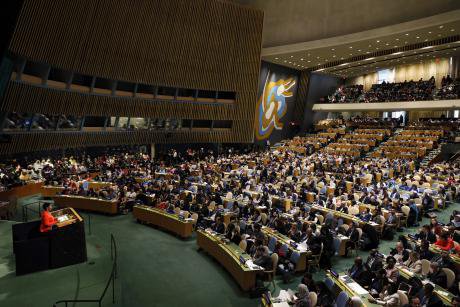
Vending machine with snacks and condoms, Berlin, Germany. Photo: Berliner Verlag/Archiv/DPA/PA Images. All rights reserved.
For our second episode of The Backlash podcast, we look at the conservative groups lobbying against women's rights at the United Nations, how they define success, and what impact these successes have on women and girls.
We hear from professor Anne Marie Goetz from the Center for Global Affairs at New York University, who was at the recent UN women's talks for 50.50, and Raimundo Rojas who attended as a delegate, as well as author Clifford Bob who explains how a 'Baptist Burka' network at the UN works against women.
We also speak to Cledwyn Atush Mamai, an organiser in Kenya's growing anti-abortion lobby, and our columnist Tiffany Mugo talks us through her recent story on teenage girls arrested in Tanzania for getting pregnant. Listen to the episode by clicking on the audio player, or you can read the full podcast transcript below.
Lara Whyte (LW): Hello and welcome to The Backlash: a podcast series tracking threats against women’s rights, brought to you by 50.50, the gender and sexuality section of openDemocracy. I’m Lara Whyte and I’m your host.
Thanks for joining us this month as we track the backlash against women’s rights. We will be hearing from our columnist Tiffany Mugo in South Africa; we will be in New York where last month the United Nations women’s rights conference took place; but first we are going to Kenya where so-called ‘pro-life’ and ‘pro-family’ groups are on the rise.
Here’s what the recent March for Life in Nairobi, Kenya sounded like:
Kenya protester: A community that does not respect life is a community that lives not in accordance to the will of God. This is why we gather today, to say no to abortion, no to irresponsible behaviour that brings down the life of the family.
LW: The march in Kenya was sponsored by dozens of organisations including CitizenGo, a Spanish right-wing group that is best known for its online petitions but increasingly its offline demonstrations. I spoke to one of the organisers of the March for Life just after it finished, Cledwyn Atush Mamai, and I start here by asking him how it went.
Cledwyn Atush Mamai (CAM): It’s been good; we had a good number that showed up. What we are now trying to do more is create awareness because it’s something that has not really been talked about. More and more people are becoming aware now on what needs to be done in the area of promoting the culture of life.
LW: Do you work with organisations from different countries?
CAM: Yes, yeah we normally have like, today we had another person from Nigeria who came to help us, and we had CitizenGo.

March for Life Kenya, March 2018. Photo: Facebook/CitizenGo.LW: How do you work with CitizenGo?
CAM: We’re now just starting to work with them; we’ve not been having them as one of our partners for a long time. So it’s only this year that we’ve begun to actually have a discussion around how we can work together in matters of promoting life in the country.
LW: Abortion is illegal in Kenya at the moment, yes? Why is there a need for a March for Life in Kenya?
CAM: We’ve always been, we seem to be, always reactive, talking about things that have happened and trying to oppose it. So what we’re trying to do is promote what is already happening in the country.
"In Kenya, so-called ‘pro-life’ and ‘pro-family’ groups are on the rise."
LW: CitizenGo collected more than 180,000 signatures on a petition this year, demanding that abortion be ‘removed from the United Nations agenda’ along with what’s called ‘comprehensive sexuality education’. The petition was presented to delegates at the UN’s annual Commission on the Status of Women talks – or the CSW, as they are known for those in the know.
Anne Marie Goetz is a professor at the Center for Global Affairs, New York University. She was formerly chief advisor on peace and security at UN Women. Anne Marie joins us now from New York. You were at the UN talks and you wrote a piece for 50.50 about the backlash there. Do you want to start by telling us a little more about that?
Anne Marie Goetz (AMG): There’s been a backlash building to women’s rights since the Beijing 1995 conference... and that of course is linked to all kinds of other geopolitical developments including the rise of religious extremism in various parts of the world; the intensification of what could perhaps be described as disgruntled and toxic masculinities clustering around misogynistic agendas; it’s been linked to financial, fiscal austerity in response to the crisis of 2008 and earlier financial crises.
So there’s been a number of things building towards the sense that women’s rights have gone too far, men are feeling disenfranchised. And let’s not forget that behind all of this is the logic of late capitalism, which is an energy that leads to the rich getting infinitely richer and the poor getting poorer and no amount of global trade and technological advances seems to be enough to reverse that polarisation between and within societies.
"There’s been a number of things building towards the sense that women’s rights have gone too far, men are feeling disenfranchised."
So that backlash has been building anyways. It has been felt at discussions at the CSW for a very long time, in part because of the role the Vatican plays, as an observer, but nonetheless as a very vocal and powerful one. And it has a very important role actually in fostering the build up of conservative voice at the Commission on the Status of Women.
So too, have theocratic countries, notably Iran, and after the breakup of the Soviet Union and the end of the very brief post-Cold War honeymoon, the intensification of authoritarian tendencies in Russia I would say have also fuelled this backlash against women’s rights which is rarely expressed as such. It’s usually expressed as simply pushing the UN to stick to established rules and stick to past agreements and not expand beyond them.
LW: One of the things you mentioned in your piece for 50.50 was how there’s these kind of strange bedfellows at these talks and…
AMG: Of course this is a recent development, because of the new administration in the US, and it first became apparent last year when the US sent a delegation to the CSW which included several very right-wing civil society organisations which had been identified by the southern law poverty group [Southern Poverty Law Center] as being hate groups when it comes to LGBTI issues, and of course they’re anti-abortion.
So this year the US has sent a delegation that is entirely made up of government personnel, of political appointees in the main, and they include people who have a record of being anti-abortion, and at least one, who is quite strongly anti-trans…
LW: That was Anne Marie Goetz, and you can read her piece – Will reactionary delegations torpedo UN talks on rural women? – on our website; that is opendemocracy.net/5050.

Commission on the Status of Women, March 2018. Photo: UN Women/Ryan Brown/Flickr. (CC BY-NC-ND 2.0). Some rights reserved.
Also at the UN talks, was Cuban-American anti-choice activist Raimundo Rojas. He wouldn’t tell me which organisation he was actually there with, but he wrote a blog accusing the United Nations of ignoring what women around the world actually want.
Raimundo Rojas (RR): We have many nations in Latin America, who have very protective laws on abortion, say, and we see that the UN, the first world, the European Union, the Americans, the Canadians, depending on the administration, want to do these social experiments on them, when what we need in the developing world is food, it’s water, it’s access to medicine, it’s you know, those are our needs.
You know, let’s feed the women of the world, let’s make sure they have access to medical care, you know, this is what women want, they want to be well-nourished, and not malnourished, and sometimes I think that gets lost in the grand scheme of things of the European Union.
To sit as I have for many years and listen to the women of Africa, listen to the women of Latin America, during negotiations that take place, you know we can talk about this and gender equality is important and access to all of these rights is important, but can we please first talk about survival? You can’t eat a condom.
"Gender equality is important and access to all of these rights is important, but can we please first talk about survival? You can’t eat a condom."
LW: But do you not think – ‘you can’t eat a condom’; sorry, is that what you just said?
RR: Yes, I believe it’s true. Well, I guess you could eat but you can’t digest it, I would say.
LW: Clifford Bob is an author and professor of political science at Du Caine University and coined the term the ‘Baptist Burkha network.’ I rang him up to find out what this term means.
Clifford Bob (CB): I did it more as a kind of colourful way to describe the interesting and in some sense surprising coalitions you see working on what they call traditional families or family value issues, and primarily working at the UN to promote their vision of traditional families, of the right to life, in opposition to groups that are promoting abortion rights or broad definitions of the family or even the basic concept of sexual orientation and gender identity.
These groups across religious lines are working at least loosely together to fight against those goals of various progressive groups, and others who might be part of that include the Holy See, and various Catholic NGOs, C-Fam is probably the most well-known of them, based in New York.
Increasingly, and this really happened after my research, I’ve been thinking I should have called it the Baptist Burkha Babushka coalition, because the Russian Orthodox Church is also heavily involved in a lot of these issues.
"I should have called it the Baptist Burkha Babushka coalition."
LW: You talk about how decades of non-action and slowdown are part of successful strategies for right-wing resistance. And so, if you look at the CSW, the Commission on the Status of Women, the real lack of achievement it has had, do you think that’s a sign that they have been successful, the Baptist Burkha Babushka Network?
CB: Yes, I definitely do. The lack of progress on women’s rights, or something like that, or especially on abortion rights, at the UN, could be seen as a failure of the pro-abortion groups. The flipside of that, I would say, is seen by the pro-life groups as a success for them, even if they haven’t actually put into place a new policy per se, they have preserved the old policy which doesn’t recognise that right, or at least not as clearly as they would like. Similarly, in the case of definitions of the family, efforts to put into significant UN documents even the terminology of sexual orientation and gender identity have generally not succeeded despite very strong efforts by gay rights groups, but that is also a success for the groups that are fighting for their very traditional view of what a family is.
LW: So the impact of these victories by the anti-rights groups is what this series is tracking.
Early forced pregnancy when it’s not an actual death sentence for teenage girls can turn into to life sentence as they are forced out of their education. In Tanzania teenage girls have actually been arrested for getting pregnant whilst in school.
"In Tanzania teenage girls have actually been arrested for getting pregnant whilst in school."
Our 50.50 columnist Tiffany Mugo reported on this earlier this week. So here’s Tiffany, on what’s happening here.
Tiffany Mugo (TM): It all comes down to this idea that women – it’s a very sort of conservative idea that women that get pregnant are just being loose, and throwing their lives away.
And it also feeds into the problem or the idea that educating and empowering the girl child isn’t exactly very helpful. So in terms of looking at girl children and education, it’s already enough of a struggle for us because people already think within the continent that putting their resources into boys is a lot better. So by the time a girl gets pregnant you’re like: ‘aw, for goodness sake,’ like: ‘what is going on here.’ Like: it’s bad enough that we had to spend money to send you to school and now this?
And it all feeds into that idea that whatever happens to a woman is her fault, so be it sexual assault, be it falling pregnant, so you find that this idea of sort of like cracking down on these girls, and the backlash against these girls – because the boys are all allowed to stay in school. It’s a distressingly widespread practice, be it officially or unofficially, because in some societies, in some spaces, girls simply won’t be sent back to school, even though it’s not like an official policy or anything, but it’s something that’s been ingrained on a state level and a sort of national level that this is how things must go, this is how things must happen.
That then brings the problem of how to fight back against something like that because it’s not official, so you can go to a school and they’ll be like ‘no, she just didn’t come back.’
"It all feeds into that idea that whatever happens to a woman is her fault."
LW: The girls who were expelled from school, they all had to do mandatory pregnancy tests, but yet they didn’t have sex education classes? To me, I just couldn’t quite get my head around that.
TM: If you had no idea about sex, how do you even begin to like ask what the hell is going on? Like when somebody says we’re testing you for pregnancy, and all you’ve ever been told is like boys are bad and like close your legs, and all sorts of other things like close your legs even when you’re just sitting around. It’s such a punishing system; it’s almost like you’re being punished for things you didn’t know, which I think for me is the most mind-boggling thing.
In Kenya, to use Kenya as an example – to look at the backlash against sex education programme within Kenya, you find that when people are asked about it a lot of them are saying: no, we don’t want it because it’s not taking into consideration our cultures, and the way we do things.
What is actually blamed for sort of the hot mess that apparently we are in, is these sort of western ideas that are brought by governments – sort of every government that comes and says ‘hey, you need to accept LGBT rights,’ and stuff like that. Or, in the case of Kenya and these sexual education programmes, the whole idea of comprehensive sexual education, is being blamed as being brought by the UN and western countries via the UN, because these sex education programmes want to look at ideas of masterbation, want to look at ideas of sexuality as a spectrum, as opposed to: ‘hello hetrosexual couple, here are baby-making tips,’ type thing.
LW: Just to stay on the UN, should the conference on women’s rights take place in New York? What’s your view on that?
TM: Oh, no. It’s a big no for me, because I know a lot of people who do incredible work who can’t access those spaces, because New York is far guys. New York is far, and getting an American visa? Oh God, forget about it.
LW: That’s it for us. Join us again next month. You can tweet us at @5050od or @Backlash_Track. Feel free to give us a bell, let us know what you think, give us some ideas, feedback also welcome. You can email us, or you can find us on Facebook.
50.50 is an independent feminist media platform. You can support our work by donating on our website. Help us track the backlash against women’s rights.
This episode of The Backlash was presented by Lara Whyte, produced by Claire Provost and Lara Whyte, and recorded and edited by Simone Lai. Original music by Simone Lai.
Read more
Get our weekly email
Comments
We encourage anyone to comment, please consult the oD commenting guidelines if you have any questions.